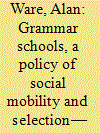| Srl | Item |
| 1 |
ID:
147828


|
|
|
|
|
| Summary/Abstract |
�is article studies the relationship between social and spatial mobility
of new urban migrants and residents. �e objective is to present the
in�uences of the household registration system on the social mobility of
China’s new urban migrants through a comparison of the di�erences
and similarities between these two groups. Two data sets are adopted in
this article: the Blue Book of Youth Nos. 1 and 2 and in-depth interviews
conducted during the summers of 2009, 2010, and 2011.
�ematic analysis was employed to understand their social mobility
a�er spatial mobility. Results show that new urban migrants are relatively
vulnerable. While society generally expects them to assimilate
rather than achieve upward social mobility, the hukou system limits
their access to social welfare and security. Meanwhile, new urban residents
who have access to advantages consider themselves lower-middle
class in terms of consumption, and maintain certain flexibility to
further establish their social and economic status. In this article,
“opportunity” is a significant theme. New urban residents strive to
leverage their urban resident status to create individual wealth.
|
|
|
|
|
|
|
|
|
|
|
|
|
|
|
|
| 2 |
ID:
153301


|
|
|
|
|
| Summary/Abstract |
Initially, four plausible reasons for introducing selection in secondary education are examined, three of which are irrelevant to contemporary debates about expanding grammar-school education. These are: first, to ration education in less advanced economies; second, to increase the supply of skilled labour within an expanded national elite; third, as part of a ‘segmented’ system of education. A fourth—increasing upward social mobility—is open to two objections: first, the May government's proposals are so limited as to have little likely impact on mobility and, second, upward mobility in the twentieth century was possible only because of structural change in the British labour market, and that will probably not continue in this century. Finally, it is argued that attempts to select the ‘best’ in any activity or skill are necessarily highly imperfect, and are far less accurate than testing who does and does not meet some minimum level of competence.
|
|
|
|
|
|
|
|
|
|
|
|
|
|
|
|